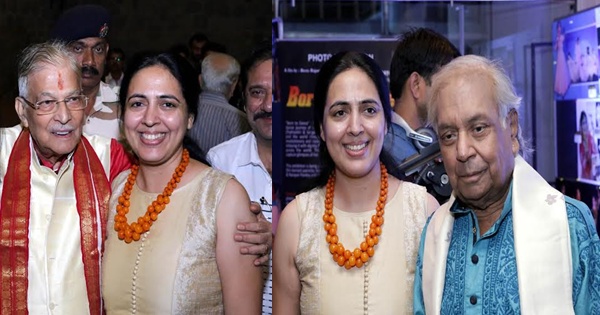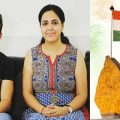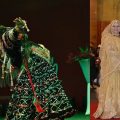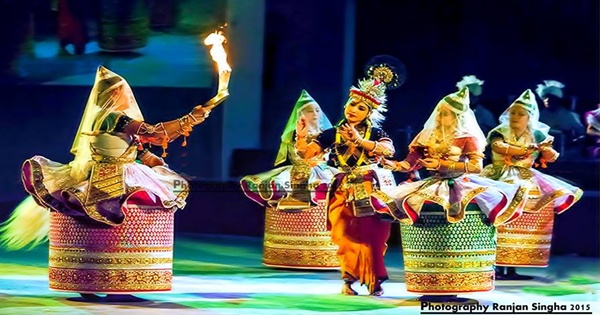- Tell us a little bit about yourself.
Born and brought up in Punjab, I am a filmmaker, pictorial photographer, philosophical thinker, and a creative fashion designer. A postgraduate in philosophy, I have written two books on photography. In the year 1999, I shifted base to Delhi for further studies in fashion and film making. And I settled down in Delhi.
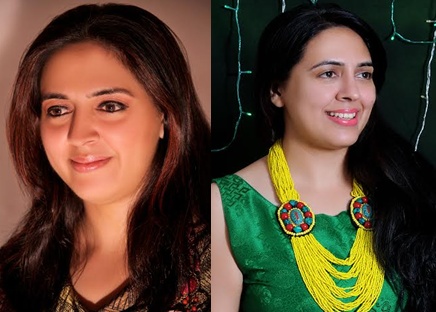
Films have been my passion since childhood. I used to watch Lekhu and Udaan regularly and tried to understand the techniques of making of series like an excited kid. I belong to a small town of Punjab, where film making and fashion designing were thorny careers to adopt. Hence, after I finished my Masters in Philosophy from Punjab University, I came to Delhi for further studies and pursue a career I love.
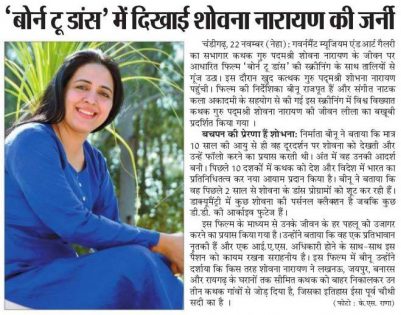
I am a very simple person. I believe in originality and take pride in the cultural ethos of India. In every project of mine, my thought revolves around it. And in my film, I always try to make things as simple as that, but in a creative manner. Some stories need to be told cinematically – and we take up those narratives with fervent passion backed by strong writing, production and editing skills that make the subject matter come alive.
- What is the role of a documentary filmmaker?
Filmmaking is a powerful medium and it’s important that documentary filmmakers continue to use it to talk about social issues, push their agendas, and more.
Movies touch our hearts and awaken our vision, and change the way we see things. They take us to other places, they open doors and minds. Movies are the memories of our lifetime, we need to keep them alive. Storytelling documentary expands our understanding of shared human experience, fostering an informed, compassionate, and connected world.
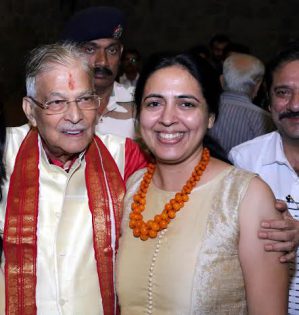
with Shri Murli Manohar Joshi, MP from Kanpur
Being a filmmaker, I think no art touches our conscience in the way film does, and goes directly to our feelings, deep down into the dark rooms of our souls.
The art of storytelling documentaries is to research, script, direct and present the subject. A few things I always keep in my mind are that the stories should come from a place of love, kindness, and truthfulness. For me, documentary film is not always about earning money. In fact, it is about the true facts and of the heart and soul.
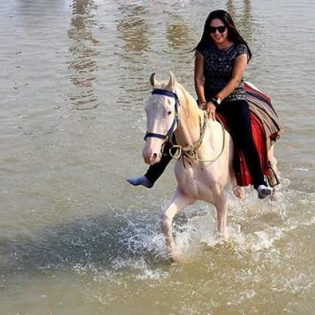
It’s much more creative for me as a director and documentary filmmaker to experiment with framing and angle of a shot while the shooting is taking place. The film is usually more beautiful when captured in the passion of the moment. The sound is more authentic and the experience as a whole is more dynamic.
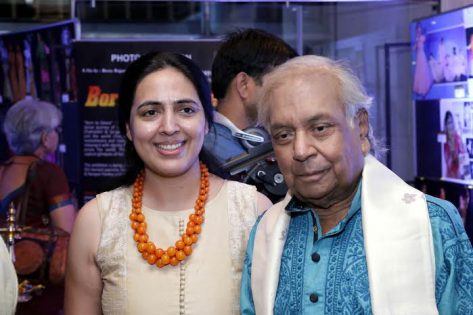
with Pt. Birju Maharaj Ji
- What inspired you to direct your documentary film Born to Dance?
Born to Dance is very special to me. I have been watching Shovana Deedi perform from last so many years. Her contribution in the field of Kathak is acknowledgeable. Padmashri Guru Shovana Narayan is a dancer who has been unafraid of treading unchartered paths. In this journey, she has broken several new grounds and paved the way for others, keeping the traditional vocabulary, format of presentation and true to the sense of the word Kathak.

Despite being a traditionalist, she has not let tradition tie her feet down. She has fearlessly and boldly moved forward with the belief that expression is instinctive and spontaneous which has to affect by the environment around us but with our actions and thought processes.
I was ten years old when I started watching Guru Shovana Narayan’s videos from Doordarshan archives.
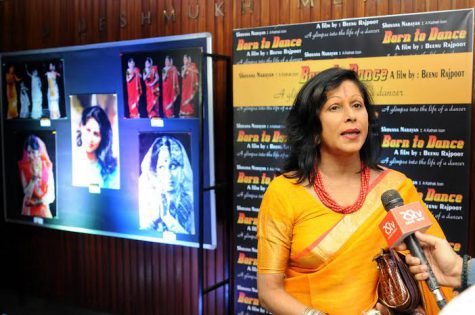
Guru Shovana Narayan at the screening of the film
And her dance always inspired me from inside with her personification of elegance, sensitivity and grace. She is a storehouse of creativity, talent and a pillar of inner strength and determination, all of which succeed in endowing her with a strangely brilliant luminosity. She has been serving the nation from five decades through her dance. And the most important part of her dancing is that every performance of hers is thought provoking.
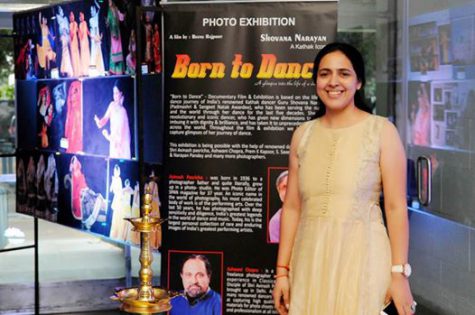
In this film I have tried to capture all the glimpses of her life. We all know that she is a brilliant dancer. In fact, she was the first female dancer who has been an IAS officer. And she was a dancer first and then a bureaucrat. I covered all the aspects of her life in this film. She is a keen researcher, writer, brilliant dancer and chorographer, silent social worker, and the most celebrated Guru. Most importantly, she is a lovely human being.
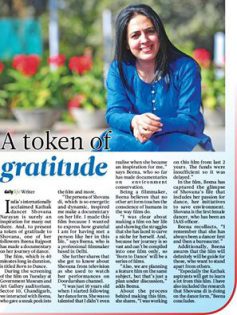
- When did you start your project Born to Dance?
From the last two years I have been working on this film. But due to insufficient funds, it has been delayed. Otherwise it could have been launched in the year 2015. That was the biggest challenging task for me to complete it. Moreover, the old video clips were in bad condition. It was just impossible to use them. But we treated them and somehow managed to use. And secondly, if you are working with Shovana Deedi, then you have to be very careful in terms of perfection. Because she is so brilliant that you cannot take things lightly. I must say she has a vision of everything.
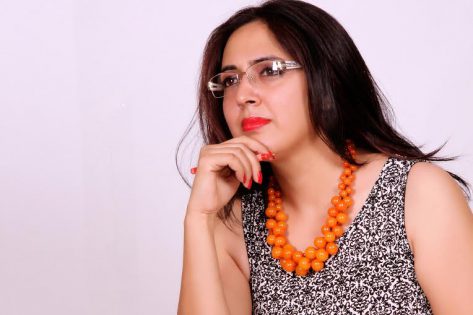
While shooting the film, there were very sad experiences as well. We used to shoot from early morning 4 am to 9 pm. One day, my whole team and Deedi were shooting constantly for 14-15 hours. We all were very tired. At the end of shoot, we thought to transfer our shooting data to computer. Due to some technical problem, we lost the whole data of our shoot. My team and myself felt very sad and were in tears. Deedi motivated us and said, “Don’t worry we will do it again”. So these are the qualities of great human beings. And she proved this for so many times. This makes her a role model to billions youngsters including me.
- Who are your inspirations?
The famous filmmaker Mr. Mike H Pandey and renowned photographer Shri O P Sharma are my Gurus. They have played an instrumental role in my life. Mike encouraged me to jump into films from still photography. And he guided me in every step of filming. So I feel I am so lucky to have a Guru like him. He is a wonderful human being as well.
Guru Shovana Narayan is my biggest inspiration. Swami Vivekananda and Dr. A P J Abdul Kalam are my role models.
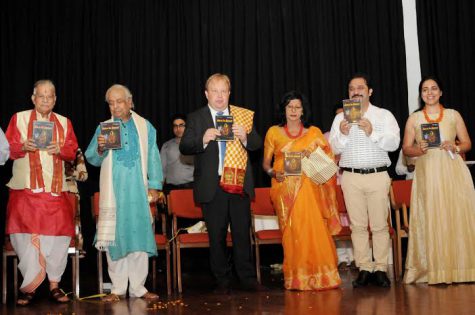
- Your hobbies?
Reading books under the lamplight at a corner, listening to classical music, watching classical dance performances, swimming, and gymming are my hobbies.
- Is research a part of your project?
Film is incredibly democratic and accessible; it’s probably the best option if you actually want to change the world, not just re-decorate it.
In order to preserve these elements, sensible and knowledgeable films can do miracles. To be honest, I think we should find first the possibility to make it. Research is first step of every documentary film. If you are not interested in research, then you never can find something interesting in the subject. My postgraduation in Philosophy has already familiarized me with research. It has now become my passion. As a filmmaker, I do a lot of research before I finalized the things.
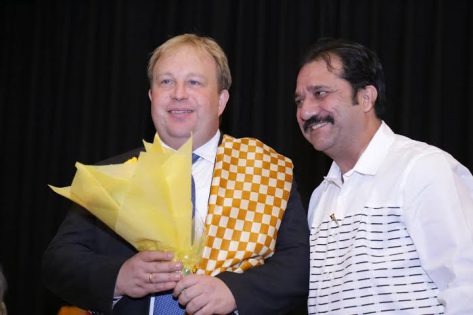
Mr. Goerge Zehetner of Austrian Embassy and Mr. Ashok Kr. Taneja at the screening of the film
- Please share with us about your future ventures if any?
Presently, I am working on 6 film projects. All are related to culture. I am also writing a book related to performing arts only. Besides, I am planning to direct a feature film for big cinema in the near future.
- What was the feedback to the recent screening of Born to Dance?
We screened the film on 11th Oct 2016 at India International Center, New Delhi. The hall was fully packed with audiences. Everybody liked this film and got huge round of applause. And people demanded for more screenings of it. We are working on it.
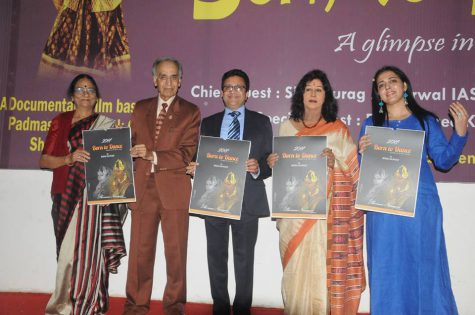
Every film should touch hearts. A film director’s dream is people should love his/her film.
And my dream as a filmmaker has come true. People gave me standing ovation with huge round of applause. That was the actual compliment and success for me.
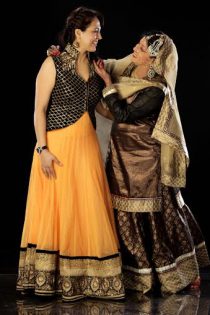
- Your message to the audience.
I think making films is something innate you can’t really teach to begin with. We learn with the experiences and experiences make one perfect.
Having knowledge of the subject and good understanding of history, literature, philosophy, performing art– is very important to work in the field of culture. And the most important fact is that there are no short cuts to impressive work.
A film should give a strong message to the society. And that always reflects in my films.

Latest posts by manoshi sinha (see all)
- What if Shaikh Paltu had Helped Mangal Panday instead of British? - April 25, 2024
- Shivaleela: Celebration of Shiva in this 21st Century Gurukul - April 25, 2024
- INA Veteran Lt Madhvan Appeals for Installation of Statue of Rash Behari Bose in Delhi - April 25, 2024

